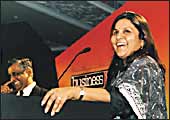 |
| The heat is on: Utpal Sen Gupta (L) and
Sangeeta Reddy debate the much-hyped cyber city Hyderabad |
The
hall had a sense of charged anticipation, and Crossfire debate moderator
and BT's Editor Sanjoy Narayan was not about to let it go. This
was about questioning Hyderabad's stature as a technology hub, and
sparks were sure to fly.
The topic for the evening offered a simple
binary choice: 'Hyderabad-Cyberabad or Hyperabad?' Sangeeta Reddy,
Executive Director (Operations), Apollo Hospitals Group, was to
speak for the reality of Cyberabad. At the other podium, Utpal Sen
Gupta, President, Agrotech Foods, was to speak for the city's image
being a case of hype.
Reddy kicked off her cyber campaign by expressing
admiration for the city's "tremendous sense of creativity and
entrepreneurial energy", and the way the city had been positioned
as an IT and ITEs hotspot on the world map. This, she argued, had
not just changed the mindset, but had also been translated into
"real infrastructure". With software exports over a billion
dollars, Hyderabad was now the "fourth most-extensive it-enabled
city" in India. Microsoft, Oracle, Excel and others are in;
the investment stats are real, and so are the 80,000 jobs that have
been created by all of it. The tomtomming, she said, had helped.
"The truth is that a little bit of hyperbole never hurt anyone."
Moreover, added Reddy, Hyderabad had seen a
ripple effect through every business, with the demand for all-round
efficiency soaring. "It has led to a powerful realisation of
the undeveloped potential of Cyberabad." Telemedicine services,
for instance, are booming too. Clinical genomics is another field
the city is rushing into, as it spreads its influence. In all, she
concluded, all the drama had been worthwhile. Finally, she pleaded,
"Don't throw Cyberabad out with the ex-chief minister."
At the opposing podium, Sen Gupta opened his
case by conceding the veracity of the facts and figures presented
by his opponent, but drawing a contrary conclusion. "For Hyderabad
to deserve to be called Cyberabad, it must satisfy either one of
two criteria or tests: it must either occupy a dominant position
in the country's it firmament or it must really dominate the city's
economy." Neither condition, he argued, were met by the city.
Bangalore, at $3 billion, and Chennai, at around $2 billion, were
both far ahead of the city, and so too Noida. "So Hyderabad
is not even in the ballpark range." On ites, Hyderabad is sixth,
behind even Kolkata. As for whether it was a major part of the city's
economy, "the argument doesn't hold", asserted Sen Gupta,
adding that "100,000 people out of a workforce of 1.7 million
people is still a small minority".
But the IT proportion is fast changing, objected
Reddy. "Look at the growth rate," she said. Sen Gupta
dismissed the point, saying that the growth rate was on too small
a base. "We must remember," interjected Narayan, "that
in a new sector the numbers must necessarily be small, but you can't
just set the whole trend aside on that basis."
"Sure," admitted Sen Gupta, "but
the workforce is around 6 per cent of the whole." Not enough
to justify Hyderabad calling itself Cyberabad. Yes, he continued,
the city's pharma, biotech, cinema and retail sectors were flourishing...
and Narayan promptly pointed this out as being in support of Reddy's
ripple argument. Sen Gupta's point though, as he clarified, was
that this was the sort of IT-enablement being witnessed across the
country, and was not something unique to Hyderabad.
Reddy, meanwhile, chose to emphasise the advantages
of the city's positioning as Cyberabad. If marketing is the game,
suggested Sen Gupta, a 'knowledge centre' would have been broader
and thus better. But, Narayan countered, focus has its value-just
as "Detroit positions itself as Motown". Besides, as Reddy
added, "You cannot be everything to everybody."
To that, Sen Gupta replied that Motown had
gone "against Detroit eventually". Though the industries
that sprang up around it are still thriving, added Narayan. At this,
Sen Gupta returned to his main point: that Hyderabad wasn't exactly
distinguishing itself as an it centre-so the position lacked credibility,
like Aeroflot's positioning itself as the airline with the friendliest
air-hostesses. "To take a positioning and make it work,"
said Sen Gupta, "it has to have a grounding in reality."
Was it real? It was the audience's turn to
pose questions, as Narayan had the microphone passed around the
hall. To a question on why Bill Gates had chosen Hyderabad, Sen
Gupta replied that Gates had seen the city as an 'emerging' it hub,
not really as an it mover-and-shaker. Another questioner wondered
if the catchy rhyming of 'Cyber' with 'Hyder' had led to the positioning;
and what could 'Bangalore' be packaged as? Well, quipped Narayan,
''Wired magazine had already done it: "Boom-galore".
BT CROSSFIRE/DELHI
Selling Reforms
The topic: 'Indian Reforms: Bad Product
or Bad Marketing?' The former, argued Surjit Bhalla. The latter,
said Arvind Virmani.
 |
| A battle of words: Arvind Virmani (L)
of ICRIER and Surjit Bhalla of Oxus cross swords at the Delhi
edition of Crossfire |
The
Taj Palace in Delhi has seen skirmishes of many kinds. The BT Crossfire,
though, promised to raise hell of a different sort: two economists
aiming their verbal artillery at each other-on a point of marketing.
Had India's reforms been a letdown? Or had they just been sold badly?
Arvind Virmani, Director & CEO, Indian Council for Research
on International Economic Relations (ICRIER), was to speak for 'bad
marketing', and at the other podium, Surjit Bhalla, Managing Director,
Oxus Research and Investments, for 'bad product'. Moderator Suhel
Seth could barely conceal his zest for a satisfying Delhi Crossfire
as the series' finale.
Virmani began his case with a big chart on
the screen to illustrate how good an "intangible product"
Indian reforms had been, highlighting the long-term link between
policy actions and outcomes. His basic point: the economy has grown
significantly faster in the period of experimenting with market
reforms (annual 5.8 per cent, 1980 onwards), than in the socialist
era (annual 3.5 per cent, 1950-1980).
The experiments? "Removing policy distortions
and introducing competition-decontrol, delicencing, and modern regulation",
some of which was "accelerated greatly in 1992". The big
turnaround, Virmani added, was that poverty had finally started
declining-at roughly 0.5 per cent per annum-after 1980.
The big picture done, Virmani spoke of specific
policy reforms. On opening up to the world, FDI has boosted overall
productivity. Lowering trade barriers has delivered specialisation
and efficiency, propelling exports instead of flooding India with
imports. Exchange rate liberalisation, meanwhile, has fixed the
trade balance and reduced the vulnerability to global shocks. Even
the "confused" telecom reforms have given India "the
lowest prices in the world for mobile telephony." The product
is good, Virmani said, but "market complexities" have
resulted in poor marketing-with media reportage often confusing
policy proposals with actual actions. "The public gets a wrong
impression," he groaned.
"So, someone's lying," shot Seth,
glowering at 'the media'. Besides, added Virmani, "All change
is not reform. Often you replace one distortion by another."
Also, some tinkering around is not reform-and when sold as such,
makes bad marketing. Like tomtomming a growth blip.
Bhalla opened his case by taking those remarks
as testimony for a 'bad product'. And bad, he asserted, it is-because
nothing good has really happened. In 15 years, he alleged, "You
didn't do any reforms. 'Market complexities' is all hogwash. We
had a bad product." Outpacing Africa, Bhalla declared, was
no thrill. "Kaun se kaddu mein teer maara?" (Which pumpkin
has the arrow shot?) Moreover, the 1980s' GDP acceleration came
on the back of a huge increase in investment. "What's the big
deal?" As for the 1990s' reforms, "How much acceleration
did you get? Zilch." From 5.6 per cent (1980-1990) to 5.75
per cent (1991-2004). "I can't see the difference. So, therefore,
we did not have reforms."
If there was any sense of complacency left,
Bhalla squashed it with a series of country-to-country comparisons.
In Asia, India's performance is still "bottom of the league".
While Asia has largely zoomed ahead, India has stayed put... feeling
good about its reforms. "What was that movie?" asked Bhalla,
almost bristling in Jerry Maguiresque exasperation, "'Show
me the money.' Yeah, show me the evidence." Reforms, he added,
ought to take India ahead at 3 per cent per capita, not 1.5 per
cent. Admitting this failure, he rounded off, would allow faster
growth.
At the moderator's podium, Seth was ready to
get the fireworks going. "He has destroyed every slide that
you put up," he told Bhalla's opponent. On his part, Virmani
accused Bhalla of bending "the facts to support his case",
contending that the post-reforms growth had come from actual productivity
as much as add-on investment. But Bhalla wasn't about to let up
his rhetoric. "Why sell India's potential short?" he asked,
"Our potential is to grow 8-9-10 per cent. I want my due."
The man's suggestion: do whatever it takes.
But would Manmohan Singh do the job? It was
the Q&A session, and someone in the audience was keen to know.
"If Manmohan Singh is marketing UPA and the Common Minimum
Programme, then we will go nowhere," replied Bhalla, "I
think he recognises that politics is politics, and economics is
the real stuff."
On primary reforms, the consensual view was,
yes, agriculture needs attention. Education and labour too. But
whom are the reforms to be marketed to? "Foreign investors,"
said Seth. "The people," said Virmani, "to create
a constituency for further reform." Both, then.
|
